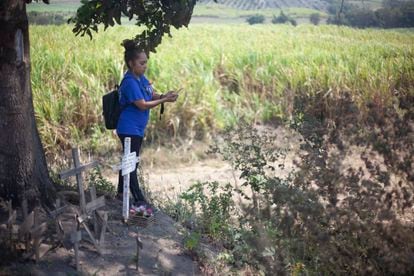A woman observes the site where clandestine graves were located in Nayarit, Mexico.Monica Gonzalez / El País
A coffin without a body. A wrong body. Or a body delivered to a mother in an unsealed black plastic bag. The relatives of disappeared persons in Mexico have documented the forensic crisis that exists in the country, where more than 52,000 deceased remain unidentified, according to the data requested by the Movement for Our Disappeared through Transparency and published this Thursday in a report. An emergency that the authorities have already recognized and have promised to stop. Next Monday, a step will be taken with the appointment of the board of directors of the new Forensic Identification Mechanism, a body of seven people promoted by the families of victims to make expert opinions on the bodies or skeletal remains. But the associations criticize that the implementation of the measures is still "very limited."
More information
Veracruz seeks the bones of shame
The morgue in Mexico in which 400 bodies are stacked unidentified
The majority of Mexican states identify less than 20% of the bodies they receive each month, according to official information cited in the report published this Thursday, which aims to be a diagnosis of the situation that serves the independent and multidisciplinary team of the Extraordinary Mechanism. of Forensic Identification, which will be appointed on August 30 by the Government and the UN.
The situation is "particularly serious" in certain states such as Baja California, Mexico City, the State of Mexico, Jalisco, Chihuahua, Tamaulipas and Nuevo León, which together account for 72% of the people whose identity is still unknown.
This lag has accumulated in the last 15 years. Relatives of the disappeared attribute it mainly to two reasons. One is the increase in violence since 2006, when President Felipe Calderón took the Army out onto the streets to fight the cartels. The war on drug trafficking has continued ever since. The violence continues to take several lives even with the arrival to power of Andrés Manuel López Obrador, who promised to change the strategy. In 2020 the country registered 27.8 homicides per 100,000 inhabitants, one of the highest rates in the world. The number of people reported missing has exceeded 90,000 since 1964.
The second reason the report points out is the "poor" functioning of the forensic services. One of the criticisms of the relatives of the disappeared is the "lack of independence" of these instances, which depend on the state prosecutor's offices despite the fact that different international human rights organizations have recommended the contrary to Mexico. "The current situation of subordination increases impunity, the fabrication of guilty, torture and criminal prosecution for political reasons," the report indicates.
According to the victims' families, these services also have insufficient personnel who have “inadequate” training and have “low salaries and temporary contracts”.
In Mexico there are 4,111 official experts associated with human identification, according to the Our Disappeared Movement, but they are not exclusively dedicated to that task.
Even though the hiring of experts has increased, the volume of work has grown in such a way in recent years that at least 20 entities have acknowledged that they keep undelivered identified bodies, at least 2,186 in the last 15 years.
Data bases "rudimentary, incomplete and little updated"
The study also points to the "little interdisciplinary work", the "deficient protocols", the "lack of supplies and equipment" and the "rudimentary, incomplete and little updated databases" that "are underused and scarcely interconnected" --14 services Forensic experts in the country, for example, do not have an electronic record of the entry of unidentified deceased persons.
Martín Villalobos, spokesman for the Movement for Our Disappeared, summarizes the sentiment of the relatives: "There is no credibility in the instances that are in charge of these identifications." "We have had cases in which wrong bodies are delivered, where the processes are victimizing and where many procedures and protocols are not respected," he says. Villalobos, whose sister-in-law has been missing for 17 years, describes that situations like this cause relatives "a lot of anguish and uncertainty."
"We need that will be there so that all the information is available and this lag can be stopped," he claims. The spokesperson for the Movement for Our Disappeared maintains that "with the construction and ordering of these databases" it would be "easier for people to be found and restored in the first days of the disappearance."
The creation of state registries has been one of the claims of the associations to the authorities. In June 2019, the federal government promised to carry out this and nine other actions to attend to the forensic emergency, with an investment of 401 million pesos. For example, the construction of forensic cemeteries or the homologation of genetic identifiers. But "very few" of those measures have been implemented, according to the relatives of the disappeared. The families have also demanded the creation of the National Forensic Data Bank, the National Registry of Unidentified and Unclaimed Deceased Persons and the National Registry of Mass Graves and Clandestine Graves, as established by law.
In Coahuila, a "fundamental" advance, according to Karla Quintana, national commissioner for the search for disappeared persons, has been the creation of a regional human identification center.
"It is the only one of its kind in Mexico and Latin America that has a generalized search approach: all the bodies that we have in Coahuila and the northeast region are contrasted with all the genetic information of the families of that region," explained Quintana in a podcast of this newspaper and added: "It would seem obvious, but unfortunately that does not happen in Mexico."
Subscribe here
to the
newsletter
of EL PAÍS México and receive all the informative keys of the current situation of this country

